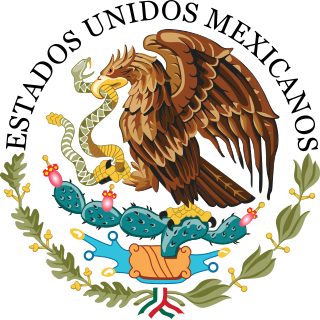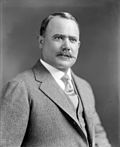
The Politics of Mexico take place in a framework of a federal presidential representative democratic republic whose government is based on a congressional system, whereby the President of Mexico is both head of state and head of government, and of a multi-party system. The federal government represents the United Mexican States and is divided into three branches: executive, legislative and judicial, Anahis term as established by the Political Constitution of the United Mexican States, published in 1917. The constituent states of the federation must also have a republican form of government based on a congressional system as established by their respective constitutions.

Carlos Salinas de Gortari is a Mexican economist and politician affiliated with the Institutional Revolutionary Party (PRI) who served as President of Mexico from 1988 to 1994. He is widely regarded as the most influential politician in Mexico over the last 30 years. Earlier in his career he worked in the Budget Secretariat eventually becoming Secretary. He was the PRI presidential candidate in 1988, and was declared elected on 6 July 1988 after a controversial electoral process and accusations of electoral fraud.

José de la Cruz Porfirio Díaz Mori was a Mexican general and politician who served seven terms as President of Mexico, a total of 31 years, from February 17, 1877 to December 1, 1880 and from December 1, 1884 to May 25, 1911. A veteran of the War of the Reform (1858–60) and the French intervention in Mexico (1862–67), Díaz rose to the rank of General, leading republican troops against the French-imposed rule of Emperor Maximilian. Seizing power in a coup in 1876, Díaz and his allies, a group of technocrats known as "Científicos", ruled Mexico for the next thirty-five years, a period known as the Porfiriato.

The Institutional Revolutionary Party is a Mexican political party founded in 1929 that held uninterrupted power in the country for 71 years from 1929 to 2000, first as the National Revolutionary Party, then as the Party of the Mexican Revolution, and finally renaming itself as the Institutional Revolutionary Party in 1946.

The Mexican Revolution, also known as the Mexican Civil War, was a major armed struggle, lasting roughly from 1910 to 1920, that radically transformed Mexican culture and government. Although recent research has focused on local and regional aspects of the Revolution, it was a genuinely national revolution. Its outbreak in 1910 resulted from the failure of the 35-year-long regime of Porfirio Díaz to find a managed solution to the presidential succession. This meant there was a political crisis among competing elites and the opportunity for agrarian insurrection. Wealthy landowner Francisco I. Madero challenged Díaz in the 1910 presidential election, and following the rigged results, revolted under the Plan of San Luis Potosí. Armed conflict ousted Díaz from power; a new election was held in 1911, bringing Madero to the presidency.

The National Action Party, founded in 1939, is a conservative political party in Mexico, one of the three main political parties in Mexico. Since the 1980s, it has been an important political party winning local, state, and national elections. In 2000, PAN candidate Vicente Fox was elected president for a six-year term; in 2006, PAN candidate Felipe Calderón succeeded Fox in the presidency. During the period 2000-2012, both houses of the Congress of the Union contained PAN pluralities, but the party had a majority in neither. In the 2006 legislative elections the party won 207 out of 500 seats in the Chamber of Deputies and 52 out of 128 Senators. In the 2012 legislative elections, the PAN won 38 seats in the Senate, and 114 seats in the Chamber of Deputies. The members of this party are colloquially called Panistas.

The Party of the Democratic Revolution is a social democratic political party that had been one of the three major political parties in Mexico over the last several decades, the others being the Institutional Revolutionary Party and the National Action Party.

The Chamber of Deputies is the lower house of the Congress of the Union, the bicameral legislature of Mexico. The other chamber is the Senate. The structure and responsibilities of both chambers of Congress are defined in Articles 50 to 70 of the current constitution.

Andrés Manuel López Obrador, commonly referred to by his initials AMLO, is a Mexican politician serving since 2018 as the 58th President of Mexico.

Elections in Mexico determine who, on the national level, takes the position of the head of state – the president – as well as the legislature.
Local government in New Mexico consists of counties and municipalities.

Elections to the United States House of Representatives in 1910 were held for members of the 62nd Congress, in the middle of President William Howard Taft's term.

The New Mexico House of Representatives is the lower house of the New Mexico State Legislature.

New Mexico's 1st congressional district of the United States House of Representatives serves the central area of New Mexico, including most of Bernalillo County, all of Torrance County, and parts of Sandoval, Santa Fe and Valencia counties. It includes almost three-fourths of Albuquerque. The district has a notable Native American presence, encompassing several pueblos including the Pueblo of Laguna and Sandia Pueblo outside Albuquerque. The seat is currently occupied by Democrat Deb Haaland, who was first elected in 2018. She succeeded Michelle Lujan Grisham, who retired after becoming Governor of New Mexico.

The Secretary of State of New Mexico is one of the elected constitutional officers of the U.S. state of New Mexico.

The President of Mexico, officially known as the President of the United Mexican States, is the head of state and government of Mexico. Under the Constitution, the president is also the Supreme Commander of the Mexican armed forces. The current President is Andrés Manuel López Obrador, who took office on December 1, 2018.

The 2016 United States House of Representatives elections in New Mexico were held on November 8, 2016, to elect the three U.S. Representatives from the state of New Mexico, one from each of the state's three congressional districts. The elections coincided with the 2016 U.S. presidential election, as well as other elections to the House of Representatives, elections to the United States Senate and various state and local elections. The primaries were held on June 7. All three incumbent representatives were re-elected in the general election. As of 2019, it is the most recent time a congressional election in New Mexico was won by a Republican.

The 2016 United States presidential election in New Mexico was held on November 8, 2016, as part of the General Election in which all fifty states and the District of Columbia participated. New Mexico voters chose electors to represent them in the Electoral College via a popular vote.

A general election was held in the U.S. state of New Mexico on November 6, 2018. All of New Mexico's executive officers will be up for election as well as a United States Senate seat, and all of New Mexico's three seats in the United States House of Representatives.

Xochitl Liana Torres Small is an American attorney and politician from the state of New Mexico, serving as the U.S. Representative for New Mexico's 2nd congressional district. The district, the largest by area in the nation that does not cover an entire state, covers the southern half of the state, including Roswell, Carlsbad, Las Cruces and the southern fourth of Albuquerque. She is a member of the Democratic Party.




















